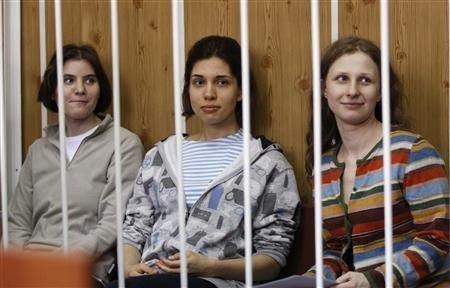Russian Punk Band On Trial: Justice Or A Victim Of Putin's Crackdown?
ANALYSIS

The trial against three members of the Russian feminist band Pussy Riot began in Moscow on Monday.
Band members Nadezhda Tolokonnikova, Maria Alekhina and Yekaterina Samutsevich, who were arrested during their "punk prayer" protest inside the Cathedral of Christ the Savior in February, all face lengthy prison sentences if found guilty of "hooliganism," normally a misdemeanor in Russia that carries either a 15-day jail sentence or a fine of 2,500 rubles ($80), according to the Moscow Times.
At first glance, it seems odd that a one-year-old Russian punk band of moderate musical ingenuity, albeit with politically inflammatory lyrics, should be a topic of conversation inside the United Nations, Council of Europe and the White House. Many of their performances don't even include instruments, and the women's identities are masked by knit balaclavas.
But the Pussy Riot trial is seen as the archetype of what many perceive as civil rights abuses committed by President Vladimir Putin's government. Putin hasn't personally commented on the trial, nor is he likely to, but many Russians suspect that the president, who has near-total control over the state, may be an influential behind-the-scenes force in guiding the case.
The fact that the trial is taking place in the same courtroom where Mikhail Khodorkovsky was tried was not lost on the Russian people. Before Pussy Riot, the Khodorkovsky case was the most talked-about example of Putin's particular style of law and order. Once Russia's richest man, Khodorkovsky was convicted of fraud after he publicly criticized the president.
Likewise, the Pussy Riot prosecution has been condemned by organizations like Amnesty International as a political show trial. Tolokonnikova, Alekhina and Samutsevich have been in jail awaiting trial since February, denied bail until next January and face seven years in prison if found guilty of hooliganism for their minute-and-a-half gig in the Moscow cathedral.
"It's absolutely not acceptable that when somebody makes such a small mistake or such a small action, [that] they be punished for seven years in prison," Switzerland's Andreas Gross, a member of the Parliamentary Assembly of the Council of Europe, stated earlier this month.
The first significant moment of the trial came when the band said it had no intention of offending worshippers, and admitted to committing an "ethical mistake." This could be a damning admission, as prosecutors are alleging that the band "infringed upon the sacramental mystery of the Church," and also "humiliated in a blasphemous way the age-old foundations of the Russian Orthodox Church" as well as inflicting "substantial damage to the sacred values of the Christian ministry."
But offense is a prerequisite of protest, and Pussy Riot, while not targeting worshippers, did mean to offend Putin -- the song they performed in the church was called "Virgin Mary, throw Putin out" -- and Patriarch Kirill, who has close ties to the president.
"The 'anti-Putin prayer service' was not something great, and should not find the response from everyone, but it is not about hooliganism, but a form of political protest, even radical," Pussy Riot's lawyer Mark Feigin told InoPressa, adding that the cathedral show was done in protest of the "archaic" relationship with the church and the government.
While the trial has attracted widespread criticism, it has also earned the band significant support. A number of international musicians have spoken out on Pussy Riot's behalf, including Sting, the Red Hot Chili Peppers, Franz Ferdinand's Alex Kapranos, Finnish jazz pianist Iiro Rantala, who canceled a show in Moscow in protest, and number of Russian stars. Peter Gabriel wrote a letter to the three imprisoned girls, telling them "I hope you will be released very, very soon. We are all watching."
The view among Russians is mixed, as it is with all matters surrounding Putin, who was elected for a third term in a landslide vote in March. A recent opinion poll found that 37 percent of Russians think that prison time is too harsh a sentence, while 39 percent would like to see the three women incarcerated for at least a year.
Not accidentally, Pussy Riot's protests and trial coincide with a growing anti-Putin movement and subsequent government crackdown against large demonstrations. The group was formed in September 2011, when Putin announced that he would run for president -- and their "guerrilla" performances followed the widely criticized State Duma elections that prompted Russia's largest post-Soviet protests.
Additionally, in a near-clairvoyant statement, another band member named Serafima told Vice that they feared a new Putin presidency would lead to increased infringements on liberties such as the right to protest, which the president arguably did in June, when he signed into law strict new penalties for unsanctioned rallies.
"I am taking it as the start of a repressive authoritarian campaign which aims to hamper the public's political activity and build a sense of fear among political activists," Pussy Riot member Samutsevich said of her trial on Monday.
"This is not only damaging us but the whole judicial system. It's a disgrace," Alyokhina's lawyer Nikolai Polozov commented.
--
© Copyright IBTimes 2024. All rights reserved.





















